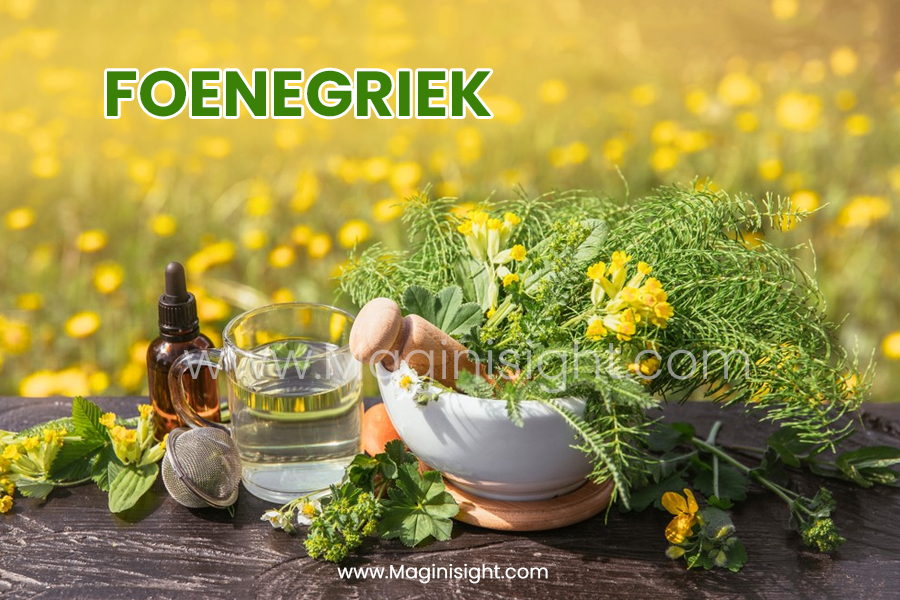Foenegriek, also widely known as fenugreek, is a remarkable herb that has been cherished for thousands of years for its culinary, medicinal, and nutritional value. Known for its distinctive aroma and slightly bitter taste, foenegriek is more than just a kitchen spice — it is a powerhouse of health benefits. From enhancing digestion to supporting hormonal balance, improving heart health, and even acting as a natural testosterone booster, this versatile herb has earned a permanent spot in traditional medicine systems and modern wellness routines.
Whether consumed as seeds, leaves, sprouts, or supplements, foenegriek offers a wealth of bioactive compounds like saponins, flavonoids, diosgenin, and 4-hydroxyisoleucine, which contribute to its therapeutic potential. Its ability to blend historical usage with modern scientific research makes it a fascinating herb for health enthusiasts, chefs, and herbal practitioners alike.
In this comprehensive guide, we will explore foenegriek in depth, covering its history, botanical characteristics, nutritional value, health benefits, culinary uses, modern research, safety, and practical applications, providing everything you need to know about this golden herb.
What is Foenegriek?
Foenegriek is an annual herb belonging to the Fabaceae family, the same family as beans and peas. The plant produces trifoliate leaves and pale yellow or white flowers, eventually forming slender pods filled with golden-brown seeds. Both the seeds and leaves are widely used across cultures — in cooking, herbal remedies, and as nutritional supplements.
The seeds are particularly prized for their nutritional density and bioactive compounds, which include:
-
Saponins – for cholesterol balance and heart support
-
Flavonoids – for antioxidant and anti-inflammatory effects
-
Diosgenin – supporting lactation and hormonal balance
-
Trigonelline – aiding metabolism and blood sugar regulation
-
4-hydroxyisoleucine – assisting insulin sensitivity
-
Phytoestrogens – contributing to hormonal support
Because of these components, foenegriek is not only a culinary delight but also a potent herbal medicine with wide-ranging health applications.
Historical Significance of Foenegriek
The use of foenegriek dates back thousands of years. Ancient civilizations across Egypt, Greece, Rome, India, and China recognized its value in both food and medicine.
-
Ancient Egypt: Foenegriek seeds were used in embalming, medicinal remedies, and even as part of royal cuisine.
-
Greece and Rome: It was considered a tonic to enhance digestion and endurance. Soldiers carried it on long journeys to maintain energy levels.
-
India: In Ayurveda, foenegriek was revered for balancing vata and kapha doshas, improving digestion, supporting hormonal balance, and promoting overall vitality.
-
China: Traditional Chinese Medicine (TCM) used foenegriek for kidney health, vitality, and strengthening the body’s natural resilience.
Its cross-cultural usage demonstrates that it has long been recognized as a trusted herbal remedy with both nutritional and medicinal significance.
Nutritional Profile of Foenegriek
The seeds of foenegriek are packed with essential nutrients and are especially beneficial for those seeking plant-based dietary options.
-
Proteins & Amino Acids: Supports muscle growth, repair, and overall cellular function.
-
Dietary Fiber: Promotes digestion, maintains satiety, and helps regulate blood sugar.
-
Vitamins: Rich in Vitamin A, C, K, B-complex, folate, and B6, supporting metabolism, brain health, and immunity.
-
Minerals: Contains iron, magnesium, manganese, phosphorus, potassium, calcium, zinc, and copper, essential for energy production and bone health.
-
Bioactive Compounds: Saponins, flavonoids, diosgenin, trigonelline, 4-hydroxyisoleucine, phytoestrogens — responsible for a wide range of health benefits.
Its combination of nutritional richness and medicinal properties makes foenegriek a unique ingredient that bridges food and wellness.
Health Benefits of Foenegriek
1. Supports Digestive Health
The soluble fiber in foenegriek seeds forms a gel-like substance in the gut, helping ease constipation, reduce bloating, and support a healthy gut microbiome. Its mucilaginous properties soothe the stomach lining, providing relief from acidity and irritation.
2. Blood Sugar Regulation and Diabetes Support
Compounds such as 4-hydroxyisoleucine help slow carbohydrate absorption, improving insulin sensitivity and aiding blood sugar regulation. This makes foenegriek a popular herbal support for people managing type 2 diabetes.
3. Heart Health and Cholesterol Balance
Saponins in foenegriek help reduce LDL cholesterol while supporting HDL cholesterol, lowering triglycerides, and promoting overall cardiovascular health. Regular consumption may reduce the risk of atherosclerosis and other heart-related conditions.
4. Hormonal Balance and Reproductive Health
Traditionally, foenegriek is used to support hormonal balance in women and enhance male vitality. It is known as a natural testosterone booster, potentially improving libido, stamina, and sperm quality. Its phytoestrogen content can also support lactation in nursing mothers.
5. Anti-Inflammatory and Skin & Hair Support
The antioxidants and bioactive compounds in foenegriek reduce inflammation, aid in managing arthritis, and improve skin health by reducing acne and irritation. Hair health is also enhanced — the seeds can be used in masks to prevent dandruff, strengthen roots, and promote hair growth.
Culinary Uses of Foenegriek
Foenegriek is as much a culinary delight as it is a medicinal herb. Its distinct nutty flavor and slightly bitter undertone make it versatile in a variety of dishes across cultures.
1. Indian Cuisine
In Indian cooking, foenegriek seeds are essential in spice blends like garam masala and curry powders. Dry-roasting the seeds enhances their nutty aroma and reduces bitterness. Leaves, known as methi, are used in dishes such as methi paratha, dal methi, and vegetable curries, adding both flavor and nutrition. Sprouted seeds are sometimes added to salads or lightly sautéed for a fresh, crunchy addition.
2. Middle Eastern and North African Cuisine
In Yemeni, Ethiopian, and Moroccan dishes, foenegriek seeds are often ground into pastas, sauces, and spice mixes, enhancing stews, tagines, and slow-cooked meals. The seeds’ natural bitterness is balanced with herbs, garlic, and citrus, creating rich and aromatic flavors.
3. European and Western Dishes
In parts of Europe, especially the Netherlands, foenegriek is used to flavor cheeses, breads, and herbal teas. Roasted seeds are added to soups and sauces, while powdered seeds can enhance smoothies or act as a nutritional supplement.
4. Tea and Beverages
Foenegriek tea or soaked seed water is a popular drink for digestion support, blood sugar regulation, and lactation support. Simply soaking seeds overnight and straining the water can create a mild, nutty-tasting tea rich in bioactive compounds.
The versatility of foenegriek in cooking ensures it can be easily incorporated into daily diets, whether for flavor, nutrition, or therapeutic purposes.
Modern Research and Scientific Insights
The therapeutic potential of foenegriek has attracted significant scientific attention in recent years. Modern studies have examined its effects on metabolism, blood sugar control, heart health, hormonal balance, and reproductive support.
1. Diabetes and Blood Sugar Control
Clinical studies show that 4-hydroxyisoleucine in foenegriek seeds improves insulin sensitivity, helping manage type 2 diabetes. Its soluble fiber slows carbohydrate absorption, reducing post-meal blood sugar spikes.
2. Cholesterol and Heart Health
Research indicates that saponins in foenegriek help reduce LDL cholesterol and triglycerides while increasing HDL cholesterol. This combination supports cardiovascular wellness, reduces the risk of atherosclerosis, and maintains healthy blood pressure.
3. Hormonal Support and Male Vitality
Several studies suggest that it acts as a natural testosterone booster, improving libido, stamina, and sperm quality in men. Its phytoestrogen content also supports female hormonal balance, helping with menstrual discomfort and lactation support.
4. Anti-Inflammatory and Antioxidant Effects
The flavonoids and saponins in foenegriek combat oxidative stress, reduce inflammation, and support joint and skin health. Research shows that regular use may help protect against arthritis, skin irritation, and other inflammatory conditions.
5. Cognitive and Metabolic Benefits
Emerging studies indicate that foenegriek may aid weight management by promoting satiety and supporting healthy metabolism. Preliminary research also suggests potential neuroprotective effects, contributing to brain health.
How to Use Foenegriek in Daily Life
Foenegriek can be easily incorporated into a daily routine for culinary and therapeutic purposes.
1. Soaked Seeds
Soak 1–2 teaspoons of foenegriek seeds overnight in water. Drink the water and chew the softened seeds in the morning for digestion support and blood sugar regulation.
2. Tea
Boil foenegriek seeds in water for 5–10 minutes, strain, and drink as a mild herbal tea. This tea is often consumed for lactation support, digestive health, and mild detoxification.
3. Powdered Seeds
Grind the seeds into powder and mix with smoothies, soups, or milk. This method allows for concentrated nutrient intake and therapeutic benefits.
4. Supplements
Capsules, tablets, and extracts are widely available for standardized dosage. These are especially useful for those seeking blood sugar regulation, hormonal support, or testosterone enhancement.
5. Topical Use
Foenegriek paste can be applied to skin and hair to combat acne, inflammation, dandruff, and promote hair growth.
Precautions and Safety Tips for Foenegriek
While foenegriek is widely recognized for its health benefits, it is important to use it thoughtfully. Like any herb or supplement, excessive consumption or improper use can lead to mild side effects. Understanding these precautions ensures safe and effective use of this powerful herb.
1. Pregnancy and Foenegriek Use
Expecting mothers should exercise caution when consuming foenegriek, as high doses of the seeds may stimulate uterine contractions. Although moderate use in food is generally considered safe, it is always recommended to consult a healthcare professional before including foenegriek supplements or teas in a pregnancy diet. Safety first is key when dealing with potent herbs.
2. Blood Sugar Monitoring
Foenegriek is known for its ability to regulate blood sugar, which makes it particularly useful for individuals managing diabetes. However, because it can lower blood sugar levels, people taking diabetes medications should monitor their glucose levels carefully. Combining foenegriek with certain medications may increase the risk of hypoglycemia if not managed properly. Regular monitoring ensures optimal benefit without unwanted side effects.
3. Digestive Sensitivity
For some individuals, consuming foenegriek in large amounts may cause digestive discomfort, including bloating, gas, or mild diarrhea. These effects are usually temporary and can be minimized by starting with a smaller dose and gradually increasing intake. Drinking plenty of water and incorporating foenegriek into meals rather than taking it on an empty stomach can also reduce digestive irritation.
4. Allergy Concerns
Although rare, allergic reactions to foenegriek may occur, especially in individuals sensitive to legumes such as chickpeas, peanuts, or lentils. Symptoms could include skin rashes, itching, or gastrointestinal upset. If any allergic reaction occurs, consumption should be stopped immediately, and medical advice sought.
Recommended Dosage
For general health purposes, the suggested daily intake of foenegriek seeds is typically 2–5 grams, while standardized supplements may range from 500–2000 mg per day. It’s always best to follow the guidance of a healthcare professional, particularly when using foenegriek to manage health conditions like diabetes, hormonal imbalance, or lactation support.
Selecting High-Quality Foenegriek Products
To fully harness the benefits of foenegriek, choosing quality products is crucial. Here’s what to look for when purchasing foenegriek:
-
Organic and Non-GMO: Opt for certified organic seeds to avoid exposure to pesticides or harmful chemicals. Non-GMO products also ensure the natural integrity of the herb.
-
Whole Seeds Over Powdered Form: Whole seeds retain their natural oils, aroma, and nutritional content longer than pre-ground powders. Grinding at home just before use preserves freshness.
-
Golden-Brown Color and Nutty Aroma: Quality foenegriek seeds should have a consistent golden-brown hue and a mild nutty fragrance. Freshness is often noticeable in both smell and texture.
-
Third-Party Lab Testing: Reliable brands provide lab-tested foenegriek to confirm purity, potency, and absence of contaminants. This ensures maximum therapeutic benefit.
Proper storage is also essential. Keep seeds in airtight containers, away from sunlight, heat, and humidity, to maintain their nutritional and aromatic qualities for months.
Global Cultivation and Economic Significance of Foenegriek
Foenegriek has a rich history of cultivation across the world, particularly in regions with warm and semi-arid climates. Today, it is grown extensively in India, Egypt, Morocco, Turkey, and China. India leads the world in both production and consumption, particularly in states like Rajasthan, Gujarat, and Uttar Pradesh, where it is an integral part of culinary and medicinal traditions.
Beyond its cultural and culinary significance, foenegriek plays a vital role in the global spice trade and the growing herbal supplement industry. With the rising demand for natural remedies, functional foods, and wellness supplements, foenegriek has become an increasingly valuable crop. Farmers benefit from its adaptability and low-maintenance cultivation requirements, while consumers worldwide gain access to its diverse health benefits.
The global market for foenegriek continues to expand as scientific research validates its therapeutic potential, ranging from blood sugar regulation and heart health to hormonal balance and male vitality. This unique herb bridges the gap between traditional remedies and modern wellness trends, making it both economically and nutritionally significant worldwide.
Final Words
Foenegriek is much more than a kitchen spice — it is a versatile herb with a remarkable blend of nutritional, medicinal, and culinary benefits. From supporting digestion and regulating blood sugar to enhancing heart health, balancing hormones, and even boosting male vitality, foenegriek has earned its place as a treasured natural remedy across cultures. Whether consumed as seeds, leaves, tea, or supplements, its bioactive compounds like saponins, flavonoids, diosgenin, and 4-hydroxyisoleucine provide a range of therapeutic effects that modern science continues to validate.
With a rich history spanning ancient Egypt, Greece, Rome, India, and China, foenegriek bridges traditional wisdom and contemporary wellness practices. By choosing high-quality, organic, and properly stored seeds or supplements, individuals can safely incorporate this golden herb into their daily routine. Its global cultivation and economic significance reflect its enduring popularity and expanding role in the health and wellness industry.
Embracing foenegriek is not just about flavoring food — it is about investing in natural health, vitality, and holistic well-being. This timeless herb truly exemplifies the powerful synergy of tradition, nutrition, and modern science.
Stay close for alerts, announcements, and breaking news. Mag Insight!








